Success Story
Caravana Vacina Já Amapá (Amapá Vaccine Now Caravan): the challenges of immunization against COVID-19 within the Amazon Forest in Brazil
April 21, 2023
Through NPI EXPAND Brazil, funded by USAID, implementation partners work to expand vaccination against COVID-19 in the Amazon region. The initiative supports projects dedicated to facing the COVID-19 pandemic and promoting the immunization of vulnerable and isolated communities. The supported projects show how collaboration among public, private, and third sectors can encourage capacity strengthening, promote innovation and improve essential public services, such as the Unified Health System (Sistema Único de Saúde – [SUS]) in Brazil. The “Immunization, Amazon, Wellness for People” series brings together the success stories of projects that became a reality.
Esta artigo está disponível em português no final desta página.
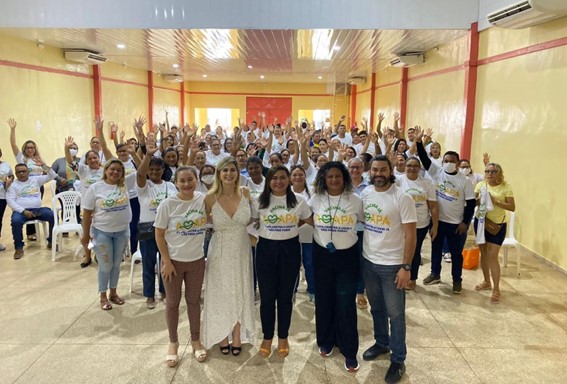
Community health agents from Santana: Caravana Vacina Já Amapá visited several municipalities across the Brazilian Amazon region offering training to local agents to promote immunization against COVID-19. Photo: Grupo Mulheres do Brasil.
Consider making a 10-hour boat trip to undertake healthcare training. Or being the only one there from your town and then going back to share your knowledge with your colleagues. Consider being part of a massive effort to spread immunization against COVID-19 through vulnerable communities across the Amazon region and helping to save people’s lives. That’s what Caravana Vacina Já Amapá (“Vaccine Now Caravan”) did in Brazil.
The caravan visited 16 municipalities across the state of Amapá, training community health agents in order to promote immunization against COVID-19. Amapá is one of the nine states that are part of the Brazilian Amazon. More than 70% of its territory is made up of protected areas, indigenous lands, and remaining quilombo communities. Amapá also has 19 areas protected by law and designated for the conservation of native forests. The state is unique in the country with such a major portion of land dedicated to preservation. One of these areas is the Tumucumaque Mountains National Park, one of the largest in the world. The park is socio-environmentally relevant, as it is home to many endemic species and different traditional people and communities, including indigenous, riverine and Brazil nut producers.
In such a context, getting vaccines – as well as other essential health services and infrastructure – to these populations can be a tough challenge. The caravan helped to change this scenario. Let’s see how.
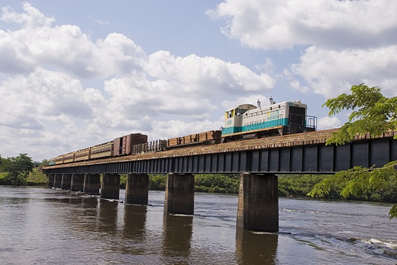
Railway bridge over the Amapari River in Pedra Branca do Amapari, one of the cities visited by Caravana Vacina Já Amapá. Photo: Governo do Amapá.
Expanding the reach of immunization
Far from urban centers, the success and effectiveness of immunization campaigns to get people vaccinated depend on achieving the necessary outreach to reach groups and communities that might otherwise not have access to prevention. To overcome this challenge, Grupo Mulheres do Brasil (Women of Brazil Group) and Fiocruz Bio-Manguinhos worked together to multiply the immunization training through four different strategies: articulation, training, multiplication, and dissemination. The partnership between the two organizations involved the development of vaccination training materials and the training of the trainers, combining the technical expertise of Fiocruz Bio-Manguinhos and the articulation capacity of Grupo Mulheres do Brasil.
It all began with a training in Macapá for 48 health professionals from all regions of the state. The goal was for each one to return to their hometowns and share their knowledge with other local health agents.
One of them was Cleicy Miranda, the local coordinator of Caravana Vacina Já Amapá. “Many people came to thank us for the opportunity to receive the training, and for the way in which they were treated and valued. This allows them to be confident about the fieldwork of immunization,” she said.
Back in their communities, the trained health professionals played a key role as multipliers of the knowledge they received in the state capital, so that other local professionals could properly assist the local community and pass on correct information about COVID-19 and the vaccine.
“I have been working recently with immunization, and I never had such a complete training. We learned theory and practice. We learned the correct way to assemble the thermal box (including for hard-to-reach locations, which is very common in Amapá) and vaccine administration techniques (intradermal and ventrogluteal),” tells Angel, a nurse from Macapá.
Through the work of professionals like Angel, the project was able to reach more than 456 community health agents across the Amapá state.
The highlight, however, was indeed the caravan. After the training in Macapá, the Caravan visited 16 cities disseminating the vaccination campaign and helping to fight misinformation. In total, 815 community health agents received the immunization training. The caravan also distributed 544 pulse oximeters among the municipalities. This equipment is used to measure blood oxygen saturation and is an essential tool for COVID-19 monitoring.
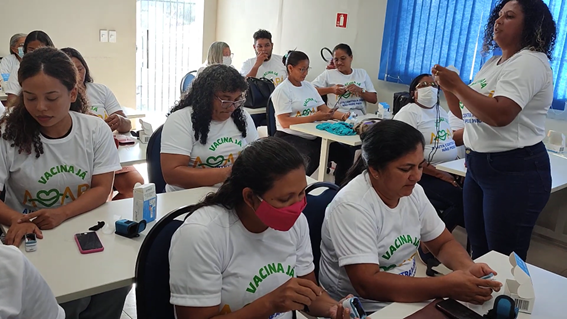
Health community agents learn how to use the oximeter. Photo: Grupo Mulheres do Brasil.
The tour began in May 2022. At that time, Amapá had one of the lowest immunization rates against COVID-19: only 18.3% of the population had the complete immunization scheme (with two doses of vaccine or a single-dose vaccine). At the end of the Caravan, in November 2022, COVID vaccine rates had risen to 57.5%.
Jardson Souza, a community health agent from the city of Pedra Branca do Amapari, emphasizes the importance of the campaign. “The training helped us a lot. Since it was a new disease, we didn’t know as much about it. And, although I’m a health professional myself, it contributed a lot to my knowledge, which I can now pass on to other people.”
It wasn’t just COVID-19 that the caravan helped to fight. The campaign also promoted immunization against poliomyelitis. After the project, there was an increase of more than 72% in the immunization coverage against the disease, placing Amapá as the second state in the country with the best coverage.
The success of Caravana Vacina Já Amapá is directly linked to collaboration. The action of local partners in each city allowed the campaign to be adapted to the reality of each geography, considering the specific needs and characteristics of the different communities attended by the project. The agents that participated in the training are resources in their communities, professionals who already have the confidence and respect of the population and who, therefore, are key players in fighting misinformation.
Elza Guerra, nurse and assistant health secretary in Pedra Branca do Amapari, points out the importance of passing on correct information. “The campaign was critical for the municipality, to clarify our doubts so that we would be able to reproduce the training with our teams and share correct information with the population”.
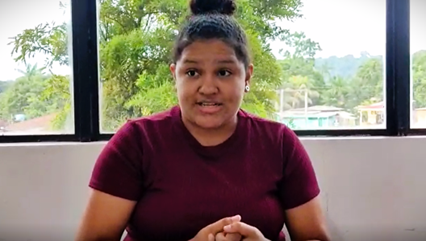
Marisa, from Pedra Branca do Amapari: the campaign brings information and reinforces the importance of the vaccine. Photo: Grupo Mulheres do Brasil.
Proof of this is the testimony of Marisa, a resident of the city. “I feel safe because [the vaccine] protects me, protects those who live around me, and the population in general. It prevents us from transmitting the disease as well. So, the campaign showed us the importance of the vaccine and also of wearing masks and washing our hands to avoid transmission.”
Immunization, prevention, and public health: strengthening the Unified Health System in Brazil
Vaccines are a proven efficient infection prevention and combat strategy. It was through vaccines that Brazil managed to eradicate diseases such as smallpox. Against COVID-19, it is no different; immunization remains the best prevention strategy. In the current political and social context, however, there are a series of “new” barriers, especially around misinformation. Add to this the fact that Brazil is a country of continental proportions, with regions where infrastructure is not always present, and the scenario becomes increasingly challenging.
In Brazil, the Unified Health System (Sistema Único de Saúde [SUS]) is public and free – it guarantees free vaccines, treatments, surgeries, and healthcare for anyone who needs it. Projects such as Caravana Vacina Já Amapá play a key role in strengthening and enhancing the system, helping immunization reach even the most distant areas.
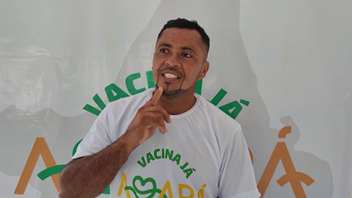
Edimilson dos Santos Pires, from Rio Cajari, who took a 9-hour boat trip to be in one of the trainings offered by Caravana Vacina Já Amapá. Photo: Grupo Mulheres do Brasil.
Fabiana Peroni, the project coordinator at the Grupo Mulheres do Brasil, considers the training of trainers one of the main achievements of the project. For her, it is an experience that can inspire and be replicated in other projects. “Without a doubt, this was the greatest achievement of the project. We went to the cities, shared important information about COVID-19, prevention, the importance of complete immunization – and, of course, we listened to people and welcomed their contributions”, she says.
Through the initiative NPI EXPAND Brazil, Grupo Mulheres do Brasil made the Caravana Vacina Já Amapá possible, increasing the reach of immunization within the Amazon region. Despite the significant increase in immunization coverage, prevention remains vital to keep COVID-19 under control, mitigate the emergence of new variants, avoid overwhelming health systems, and, above all, to take care of people’s health.
About the partnership: NPI EXPAND Brazil is led by United States Agency for International Development (USAID) and implemented by Palladium with fiduciary support from Sitawi – Finanças do bem. USAID is allocating funds to civil society organizations working in the Brazilian Amazon in urgent response to COVID-19. The funding supports the implementation of 23 projects in the nine Amazonian states. The activities are held in partnership with local, state and federal health authorities. “Caravana Vacina Já Amapá,” implemented by Grupo Mulheres do Brasil, also received technical support from Fiocruz Bio-Manguinhos and from a partnership with the Council of Municipal Health Secretaries of the State of Amapá (COSEMS/AP) and the State Health Secretary of Amapá.
Caravana Vacina Já Amapá: os desafios da imunização contra a COVID-19 na região amazônica
Por meio da NPI Expand Brasil, financiada pela USAID, parceiros implementadores trabalham para ampliar a vacinação contra a COVID-19 na região amazônica. A iniciativa apoia projetos dedicados a enfrentar a pandemia de COVID-19 e a promover a imunização de comunidades vulneráveis e isoladas. Os projetos apoiados pela iniciativa demonstram como a colaboração entre esfera pública, iniciativa privada e o terceiro setor pode estimular o fortalecimento de capacidades institucionais, promover inovação e aprimorar serviços públicos essenciais, como o Sistema Único de Saúde. A série “Imunização, Amazônia, Bem-estar para as Pessoas” reúne as histórias de sucesso dos projetos que se tornaram realidade.
Imagine fazer uma viagem de barco de 10 horas para participar de uma capacitação. Ou ser o único de sua cidade e depois voltar para compartilhar os novos conhecimentos com seus colegas. Imagine fazer parte de um amplo esforço para levar a vacinação contra a COVID-19 a comunidades vulneráveis na região amazônica e ajudar a salvar vidas. É o que a Caravana Vacina Já Amapá fez no norte do país.

Community health agents from Santana: Caravana Vacina Já Amapá visited several municipalities across the Brazilian Agentes comunitários de saúde em Santana: a Caravana Vacina Já Amapá visitou diversos municípios da Amazônia brasileira levando treinamentos a agentes locais para promover a vacinação contra a COVID-19. Foto: Grupo Mulheres do Brasil.
A Caravana percorreu 16 municípios do Amapá, na Região Norte do Brasil, treinando agentes comunitários de saúde para promover a vacinação contra a COVID-19. O Amapá é um dos nove estados brasileiros que fazem parte da Amazônia brasileira. Mais de 70% de seu território é composto por unidades de conservação, terras indígenas e comunidades remanescentes de quilombos. No Amapá, também estão localizadas 19 áreas protegidas por lei que visam a conservação da mata nativa. O estado é o único no país com uma porcentagem tão significativa de áreas dedicadas à preservação. Uma delas é o Parque Nacional Montanhas do Tumucumaque, um dos maiores do mundo e de extrema relevância socioambiental, por abrigar diversas espécies endêmicas e diferentes grupos tradicionais, como indígenas, ribeirinhos e castanheiros.
Em um contexto como esse, fazer com que vacinas – assim como outros serviços e infraestruturas essenciais – cheguem a essas populações pode ser um desafio significativo. A Caravana ajudou a mudar esse cenário. Vamos entender como.
Ampliando o alcance da vacinação
Longe dos centros urbanos, o sucesso e a efetividade das campanhas de vacinação dependem de atingir capilaridade suficiente para chegar a grupos e comunidades que poderiam não ter acesso à prevenção se as vacinas não chegarem ao lugar onde estão. Para superar esse desafio, o Grupo Mulheres do Brasil e a Fiocruz Bio-Manguinhos trabalharam juntos em quatro estratégias: articulação, treinamento, multiplicação e disseminação. A parceria entre as duas organizações, unindo a expertise técnica da Fiocruz Bio-Manguinhos e a capacidade de articulação do Grupo Mulheres do Brasil, envolveu a elaboração de materiais sobre imunização e a capacitação de agentes de saúde que então seriam responsáveis por reproduzir o treinamento em suas cidades.
Tudo começou com um curso sobre vacinação realizado em Macapá, capital do Amapá, para 48 profissionais de saúde de todas as regiões do estado. O objetivo era que cada um pudesse retornar aos municípios de origem e compartilhar seus conhecimentos com outros agentes locais.
Uma delas foi Cleicy Miranda, coordenadora local do Vacina Já Amapá. “Os profissionais se sentem gratos pela oportunidade de repassar a capacitação e pela forma como foram tratados e valorizados. Isso permite que sigam confiantes em seu trabalho de campo”, comenta.

Ponte ferroviária sobre o Rio Amapari, em Pedra Branca do Amapari, uma das cidades visitadas pela Caravana Vacina Já Amapá. Foto: Governo do Amapá.
De volta a suas cidades, agentes de saúde desempenharam papel fundamental como multiplicadores do treinamento recebido na capital para que outros profissionais pudessem prestar atendimento adequado à comunidade e passassem informações corretas sobre a COVID-19 e a vacina.
“Trabalho há pouco tempo no ramo da imunização e nunca havia participado de uma capacitação tão completa. Vimos a parte teórica e, em seguida, a prática. Aprendemos a forma correta de montar a caixa térmica (inclusive para áreas de difícil acesso, o que é muito comum no Amapá) ou a aplicação de técnicas para administração de vacinas (intradérmica e ventroglútea)”, conta a enfermeira Angel, de Macapá (AP).
Por meio do trabalho de profissionais como Angel, o projeto foi capaz de multiplicar o treinamento recebido sobre vacinação para 456 agentes comunitários de saúde no Amapá.
O grande diferencial, contudo, foi de fato a Caravana. Depois do treinamento em Macapá, a Caravana passou por 16 cidades expandindo a campanha de vacinação e ajudando a combater a desinformação. No total, 815 agentes comunitários de saúde receberam o treinamento de vacinação. O projeto também distribuiu 544 oxímetros entre os municípios visitados. O equipamento é utilizado para medir a saturação de oxigênio no sangue e é um item essencial para o monitoramento da COVID-19.

Agentes comunitários de saúde aprendendo a usar o oxímetros. Foto: Grupo Mulheres do Brasil.
O projeto começou em maio de 2022. O Amapá, então, registrava uma das mais baixas coberturas vacinais contra a COVID-19: apenas 18,3% da população tinha o esquema vacinal completo (com as duas doses da vacina ou vacina de dose única). Ao final da ação da Caravana, em novembro de 2022, esse índice subiu para 57,5%.
Jardson Souza, profissional da saúde de Pedra Branca do Amapari, enfatiza a importância da campanha: “O treinamento ajudou muito. Porque é uma doença nova, não sabemos tanto sobre ela. E, apesar de eu ser da área da saúde também, contribuiu muito para o meu conhecimento, que agora posso passar para outras pessoas”.
E não foi só a COVID-19 que o projeto ajudou a combater. A campanha também promoveu a vacinação contra a poliomielite. Depois das ações do projeto, foi registrado um aumento de mais de 72% na cobertura vacinal contra a doença, colocando o Amapá como o segundo estado no país com a melhor cobertura na Campanha Nacional contra Poliomielite.
O sucesso da Caravana Vacina Já Amapá está diretamente associado à colaboração. A atuação dos parceiros em cada cidade permitiu que os conteúdos da campanha fossem adaptados à realidade local, considerando necessidades e características específicas das diferentes comunidades atendidas pelo projeto. Os agentes treinados são referências em suas comunidades, profissionais que já têm a confiança e o respeito da população e que, por isso, são fundamentais para garantir também o combate à desinformação.
Elza Guerra, enfermeira e secretária de saúde adjunta de Pedra Branca do Amapari, comenta sobre a importância de passar informação correta às pessoas: “A campanha foi muito importante para o município. Ajudou a esclarecer nossas dúvidas para podermos compartilhar o treinamento com nossas equipes e informar corretamente a população”.
Prova disso é o depoimento de Marisa, moradora da cidade. “Me sinto segura porque [a vacina] me protege e protege quem vive ao meu redor e a população em geral, porque a vacina ajuda a não transmitir a doença também. A campanha foi importante para mostrar para a gente a importância da vacina e também de usar a máscara, higienizar as mãos, para evitar transmitir”, avalia.

Marisa, de Pedra Branca do Amapari: a campanha traz informação e reforça a importância da vacina. Foto: Grupo Mulheres do Brasil.
Imunização, prevenção e saúde pública: fortalecendo o SUS
As vacinas são uma estratégia de prevenção e combate comprovadamente eficiente. Foi por meio das vacinas que o Brasil já conseguiu erradicar doenças como sarampo, rubéola e varíola. Contra a COVID-19, não é diferente: a vacinação continua sendo a melhor estratégia de prevenção. No atual contexto político e social, porém, esse trabalho esbarra em uma série de desafios, em especial a desinformação. Some-se a isso o fato de que o Brasil é um país de proporções continentais, com regiões onde nem sempre as infraestruturas estão presentes, e o cenário pode ser desafiador.
No Brasil, o Sistema Único de Saúde é público e gratuito – garante vacinas, tratamentos, cirurgias e cuidados de saúde gratuitos para qualquer pessoa que precisar. Projetos como a Caravana Vacina Já Amapá desempenham um papel fundamental ao fortalecer e potencializar o SUS, contribuindo para que a vacinação alcance mesmo as áreas mais distantes dos centros urbanos.

Edimilson dos Santos Pires, de Rio Cajari, que viajou de barco por 9 horas para participar de um dos treinamentos oferecidos pela Caravana Vacina Já Amapá. Foto: Grupo Mulheres do Brasil.
Fabiana Peroni, coordenadora do projeto no Grupo Mulheres do Brasil, considera o trabalho de multiplicação dos treinamentos uma das principais conquistas do projeto. Para ela, é uma experiência que pode inspirar e ser replicada em outros projetos. “Com certeza, esse foi o maior diferencial do projeto. Fomos até os municípios, compartilhamos conteúdos importantes sobre a doença, as formas de prevenção, a importância da vacinação completa – e, claro, ouvimos as pessoas e acolhemos suas contribuições”, comenta.
Por meio do trabalho conjunto em parceria com a NPI Expand Brasil, o Grupo Mulheres do Brasil possibilitou que a Caravana Vacina Já Amapá se tornasse uma realidade, aumentando o alcance da vacinação na região amazônica. Apesar do aumento significativo na cobertura vacinal, a prevenção continua sendo vital para garantir o controle da COVID-19, administrar o surgimento de novas variantes, evitar a sobrecarga dos sistemas de saúde e, principalmente, cuidar da saúde das pessoas.
Sobre a parceria: A NPI Expand Brasil é liderada pela Agência dos Estados Unidos para o Desenvolvimento Internacional (USAID) e implementada pela Palladium, com apoio fiduciário da Sitawi – Finanças do bem. A USAID está alocando fundos para organizações da sociedade civil que trabalham na Amazônia brasileira com o objetivo de fortalecer o combate à COVID-19. O financiamento ajuda a implementar 23 projetos nos nove estados amazônicos. As atividades são realizadas em parceria com autoridades de saúde locais, estaduais e federais.